
Guests
- Yousef MunayyerPalestinian American analyst, head of the Palestine-Israel program at Arab Center Washington DC.
- Daniel Levypresident of the U.S./Middle East Project and a former Israeli peace negotiator under Prime Ministers Ehud Barak and Yitzhak Rabin.
President Donald Trump met at the White House Tuesday with Israeli Prime Minister Benjamin Netanyahu, where Trump again suggested ethnically cleansing Gaza of its Palestinian population. Trump has already mused about moving Gaza’s population to Jordan and Egypt, which those countries have flatly rejected, but on Tuesday he went even further and said the United States should “own” Gaza and develop it into a seaside tourist destination. “Nothing has been more destabilizing for the region over the last eight decades than the ethnic cleansing of Palestinians by Israel, and nobody at any level is going to sign up for a continuation of that,” says Palestinian American analyst Yousef Munayyer, who calls Trump’s plan “ethically and morally repugnant.” We also speak with former Israeli peace negotiator Daniel Levy, who says Israeli society is currently “giddy with excitement” over Trump’s presidency. But he adds that “perhaps Israel’s greatest Achilles’ heel is if it actually falls for the idea that America is all-powerful.”
Transcript
AMY GOODMAN: In a stunning announcement, President Trump has called for the United States to take over Gaza and displace the entire Palestinian population in order to turn Gaza into what he called the, quote, “Riviera of the Middle East.” Trump’s plan for ethnic cleansing has been widely condemned across the globe. Trump outlined his plan Tuesday in a joint news conference with Israeli Prime Minister Benjamin Netanyahu at the White House. In November, the International Criminal Court issued an arrest warrant for Netanyahu for committing war crimes and crimes against humanity. This is part of what Trump said on Tuesday.
PRESIDENT DONALD TRUMP: The only reason the Palestinians want to go back to Gaza is they have no alternative. It’s right now a demolition site. This is just a demolition site. Virtually every building is down. They’re living under fallen concrete that’s very dangerous and very precarious. They instead can occupy all of a beautiful area with homes and safety, and they can live out their lives in peace and harmony, instead of having to go back and do it again.
The U.S. will take over the Gaza Strip, and we will do a job with it, too. We’ll own it and be responsible for dismantling all of the dangerous unexploded bombs and other weapons on the site, level the site and get rid of the destroyed buildings, level it out, create an economic development that will supply unlimited numbers of jobs and housing for the people of the area — do a real job, do something different, just can’t go back. If you go back, it’s going to end up the same way it has for a hundred of years.
AMY GOODMAN: Trump went on to describe his vision of a U.S.-controlled Gaza that had been cleared of Palestinians.
PRESIDENT DONALD TRUMP: We have an opportunity to do something that could be phenomenal. And I don’t want to be cute. I don’t want to be a wise guy. But the Riviera of the Middle East, this could be something that could be so — this could be so magnificent.
AMY GOODMAN: During his White House press conference, Trump was questioned about the role of the U.S. military and his plan to take control of Gaza and force out the Palestinian population.
REPORTER: Given what you’ve said about Gaza, did the U.S. send troops to help secure the security vacuum?
PRESIDENT DONALD TRUMP: As far as Gaza is concerned, we’ll do what is necessary. If it’s necessary, we’ll do that. We’re going to take over that piece, and we’re going to develop it, create thousands and thousands of jobs. And it will be something that the entire Middle East can be very proud of.
AMY GOODMAN: Trump’s plan quickly drew condemnation at home and abroad. Saudi Arabia reiterated it will not establish ties with Israel without the creation of a Palestinian state. Arab leaders have already refused calls to take in Palestinians forcibly removed from Gaza. Francesca Albanese, the U.N. special rapporteur on the Occupied Palestinian Territory, has said Trump’s plan is “unlawful, immoral and completely irresponsible.” She said, quote, “It’s incitement to commit forced displacement, which is an international crime,” unquote.
In Gaza, Palestinians also rejected Trump’s plan. This is Yasser Safi, speaking in Khan Younis.
YASSER SAFI: [translated] We got out of wreckage, destruction and a war of attrition, a genocide, in which we don’t know when death will come to us from all directions. But we stayed, held on and remained until the last breath. This president who is called Donald Trump comes to us with a new method to displace us from our country where we are rooted. This is our land. We will not get out of it. If you refuse that there would be rebuilding, life or future, and you come up with another idea in which Smotrich, Ben-Gvir or others call for us to get displaced, this is absolutely refused, even if you fight us with our food or our rebuilding. And you can see this wreckage here. Here, we set up a tent on the rubble.
AMY GOODMAN: We’re joined now by two guests. Daniel Levy is president of the U.S./Middle East Project, a former Israeli peace negotiator under two Israeli prime ministers, Ehud Barak and Yitzhak Rabin. He’s joining us from London. And in Washington, D.C., we’re joined by Yousef Munayyer. He is a Palestinian American analyst, the head of the Palestine-Israel program at Arab Center Washington DC.
Yousef, we’re beginning with you. Your response to President Trump’s proposal for the U.S. to occupy — rather, to own Gaza?
YOUSEF MUNAYYER: Right. Thank you, Amy.
Well, look, we saw yesterday a convicted felon in the White House meeting with an indicted war criminal in Benjamin Netanyahu. And I don’t think we should be surprised that the outcome is yet another conspiracy to commit further crimes — in this case, with the forced displacement, ethnic cleansing and now, apparently, an American project of attempting to overtake and annex the Gaza Strip. It’s important, too, to keep in mind that this is just the latest in a series of territories that are not American that this president seems to want to take over, after Greenland and the Panama Canal and Canada and whatever else.
What we are witnessing here is not diplomacy but criminality by a couple of mafiosos who think this is how you do business. They have a complete disregard for law. They have a complete disregard for rights. And their vision for the world is one in which power is all that matters, and they seek to use the power they have to take more of what belongs to other people. This is a world of chaos and danger, which we learned the very steep price and consequences of in the previous century. And I can guarantee you that Palestinians will be the first to reject this vision for the world, along with much of the region and the international community, as well.
JUAN GONZÁLEZ: Yeah, and, Yousef, about the rest of the region, clearly, the masses of the people in many of the countries of the Middle East support the Palestinians, but the governments of many of these states have, to say the least, been equivocal or AWOL in terms of confronting Israel. What’s your sense of the impact that this kind of announcement, this kind of policy by the United States might have on the governments of the region?
YOUSEF MUNAYYER: I think one thing we have to remember is, from the perspective of the region, whether it is at the level of the public or at the level of governments, one thing that is clear to everybody is that nothing has been more destabilizing for the region over the last eight decades than the ethnic cleansing of Palestinians by Israel. And nobody at any level is going to sign up for a continuation of that. It’s not just ethically and morally repugnant, it’s also destabilizing and contrary to the national interests of everyone in the region. So I don’t think it’s something that anyone is going to voluntarily cooperate with.
In my view, this is a region that has been suffering from what the Israelis have done to the Palestinians and the ethnic cleansing of Palestinians for a very long time, much longer than any presidential term, much longer than Donald Trump will be around. And they’re going to weigh the consequences of such a proposal through the lens of a much longer term than just the few years that Donald Trump is going to be with us.
JUAN GONZÁLEZ: And, Daniel Levy, your response to this extraordinary announcement of Donald Trump that the United States intends to own Gaza?
DANIEL LEVY: I look at that, and I looked at the images of that sickening press conference, and you could not draw a starker contrast than the one between the words of those two leaders — one, as Yousef said, a felon and the other with an arrest warrant for war crimes — surprise, surprise, two settler-colonial leaders planning the renewed attempt at ethically cleansing an Indigenous population. But you could not draw a sharper contrast between those words and the realities in Gaza of the resilience of the Palestinian people, which we have all been witness to, amidst all the devastation and killing, those scenes. Is he even aware that hundreds of thousands of people have just picked up whatever of their belongings they have and gone back to reconstruct lives in that rubble?
So, I’m tempted to say, Juan, that, you know, maybe we should take some solace from this being so not serious, I would argue, so not implementable a plan. I actually worried that they would come out with something yesterday that could gain traction, could have legs. I don’t think that applies to this plan. I don’t see how they do it with the realities of Palestinians, with the realities in the region. I’m sure they have whiplash in the DOD, in the U.S. military. “Wait, sir, are we supposed to be planning for the invasion of Greenland, the Panama Canal or Gaza?” And even Peter Hegseth’s DOD is going to struggle with all of that.
And therefore, I look at this, and I say: Yes, dangerous. Dangerous because of the fertile environment on which it falls inside Israel, a country that, if you see the statements of political leaders, including from the so-called opposition, giddy with excitement, a country that has undertaken these genocidal actions, that does actually have those plans and those intentions to make this real. But perhaps Israel’s greatest Achilles’ heel would be if it actually falls for the idea that America is all-powerful. And in a day when it’s very hard to take a deep breath and count to 10, I would urge people to remind themselves of all those other great plans to shape and fashion and design the Middle East region, West Asia in America’s image. And how did those end up? And what did that do for America? Because this does nothing to serve American interests whatsoever.
AMY GOODMAN: I want to remind people what Trump’s son-in-law, former adviser Jared Kushner said about Gaza containing very valuable waterfront property last year.
JARED KUSHNER: And Gaza’s waterfront property, it could be very valuable to — if people would focus on kind of building up, you know, livelihoods.
AMY GOODMAN: So, that was Jared Kushner last year. Daniel Levy, I wanted to ask you if, in fact — Trump has put forward several times that Jordan, that Egypt should take the entire Palestinian population. And he hasn’t gotten much traction. So he takes it a step further, and he says, “Not only should they be displaced, but we will occupy or we will own Gaza.” And so, then it looks like he’s compromising, “Well, maybe the U.S. troops don’t move in, but we won’t move in if you, Egypt, if you, Saudi Arabia, and you, Jordan, take the Palestinian population.” Is this part of a strategy? He did not say that is off the cuff. I want to be very clear about this. For people listening on the radio, in fact, he is looking down, reading his notes.
DANIEL LEVY: Yes.
AMY GOODMAN: And when Netanyahu responds, he is doing — he sounds like he’s off the cuff, saying, you know, “This is Trump,” but he is clearly reading his response. And does this then satisfy the far right in Israel, if Netanyahu isn’t that, to keep his coalition together, because then there’s something that would allow them to move into the second phase of the ceasefire?
DANIEL LEVY: Very important. Indeed, much of the Israeli media is running with a story that these plans were presented by Netanyahu, by his right-hand henchman, Minister Ron Dermer, who used to be ambassador in the U.S., in America, Miami, Republican, earlier in life, that they cooked this up. And I think Netanyahu comes away with a victory image in Washington, D.C., the very victory image that he has been denied in Palestine, in Gaza, as we see that this idea of a total victory, the emaciation, destruction of Hamas not happening, the Palestinians giving up not happening. So, he has a win in Washington.
The slight problem for Israel is that Israel is geographically not the 51st state of the U.S.A. So, when he goes home, he goes home to a region that has been watching on its social media feeds the self-incriminating postings of Israelis conducting these atrocities. And it’s not a region that Israel is making itself any more amenable to being able to absorb, to live with.
Now, Netanyahu, I think, comes out of this, yes, feeling politically strengthened. His coalition allies, who have been wavering because they don’t want — neither did Netanyahu, by the way — they don’t want this Gaza ceasefire deal, which I think has now been endangered to the point of very likely its collapse, after all, perhaps even during phase one, being guaranteed. But those coalition allies have come around and said, “Now we see a way to continuing to support you. This is great.” Netanyahu may feel empowered to go further, to even call an early election. He hasn’t got what he wanted on Iran, and normalization with Saudi Arabia seems to have really taken a back-burner role here. But the idea that this can be actualized — and I think here Netanyahu has a bit of a dilemma in a way, because he will now think, “Maybe I have to make good on this.”
Now, we hear this narrative from the administration: “It’s the humane” — they actually said this — “It’s the humane thing to do, because who could live in those circumstances?” The humane thing to do would not have been to send those bombs. And let’s not pretend that Biden didn’t send the bombs. This is the legacy of the genocidal Biden administration. The humane thing to do would have been not to have sent those bombs, to have prevented this long ago. And you know what? If you really are talking about the well-being of the Palestinians, well, there is an area adjacent to Gaza where many in Gaza, many Palestinians come from originally, in the south of Israel, in the Negev, in the Naqab, an area that they could go back and forth, work in Gaza. So this is not about those things.
And I would just point out the degree of concern in the region, when the Saudis take to their own social media in the middle of the night to reject this. And what you might see if it were actually implemented, which I don’t think it will be — I really don’t — is Jordan and Egypt becoming frontline resistance states, something they haven’t been until now. So, the unintended consequences rule really plays out here. And I think the other headline is —
JUAN GONZÁLEZ: Yeah, I was —
DANIEL LEVY: — what does the rest of the world — I just want to say: What do allies make of an America apparently so incapable of working out priorities? What are you thinking now if you’re in Europe dealing with Ukraine? And indeed, what are you thinking if you’re on the other side of that ledger, when you watch America floundering around with madcap schemes?
JUAN GONZÁLEZ: Yeah, I wanted to ask Yousef: The other announcements of the Trump administration related to the Middle East that occurred on Tuesday, the halt of funding for the Palestinian — extending the halt of funding for the Palestinian relief agency UNRWA, Trump’s authorization of the transfer of more 2,000-pound bombs to Israel, and his executive order reimposing maximum pressure on Iran?
YOUSEF MUNAYYER: Yeah, well, I think that, you know, again, this is not particularly surprising. Trump is searching for ways to appear more pro-Israel than his predecessor, which, as Daniel noted, supported the Israeli military through a horrific genocide for 15 months, one that is in many ways still ongoing and expanding to other parts of Palestine as we speak. And so, these kinds of steps that he is taking is very much being done to further that image that somehow Joe Biden was not pro-Israel enough and that, you know, he is even more supportive of what Israel is doing.
I think one thing to keep in mind in the background of this conversation is that after Elon Musk, the second-biggest contributor to Donald Trump’s reelection campaign was Miriam Adelson, who gave $100 million to Donald Trump’s reelection effort, and this is also one of the biggest supporters of Benjamin Netanyahu. And I believe she was in attendance yesterday at all of the events between the two criminals who were gathering at the White House.
AMY GOODMAN: Well, Yousef Munayyer, we want to thank you for being with us, Palestinian American analyst, head of the Palestine-Israel program at the Arab Center Washington DC, and Daniel Levy, former Israeli peace negotiator, president of the U.S./Middle East Project.
Coming up, we look at the fight against Trump’s escalating attacks on the trans community with ACLU attorney Chase Strangio. The ACLU is suing the Trump administration. And we’ll speak to a New York doctor who says he’ll continue providing healthcare to transgender youth. Then, a lawyer with the EEOC, the Equal Employment Opportunity Commission, was fired last week by the Trump administration. Stay with us.
[break]
AMY GOODMAN: “Luther” by the Grammy Award-winning Kendrick Lamar and SZA. Happy birthday, Arthur!


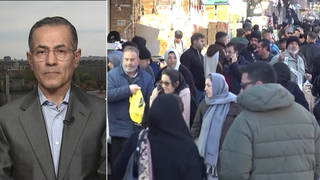
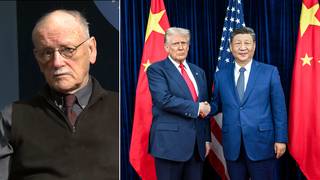



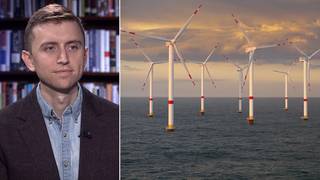

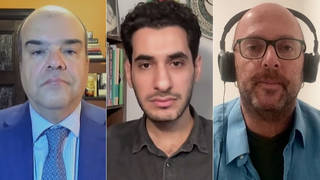

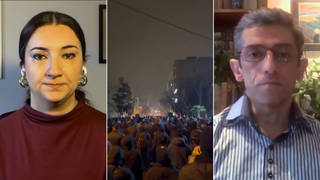
Media Options